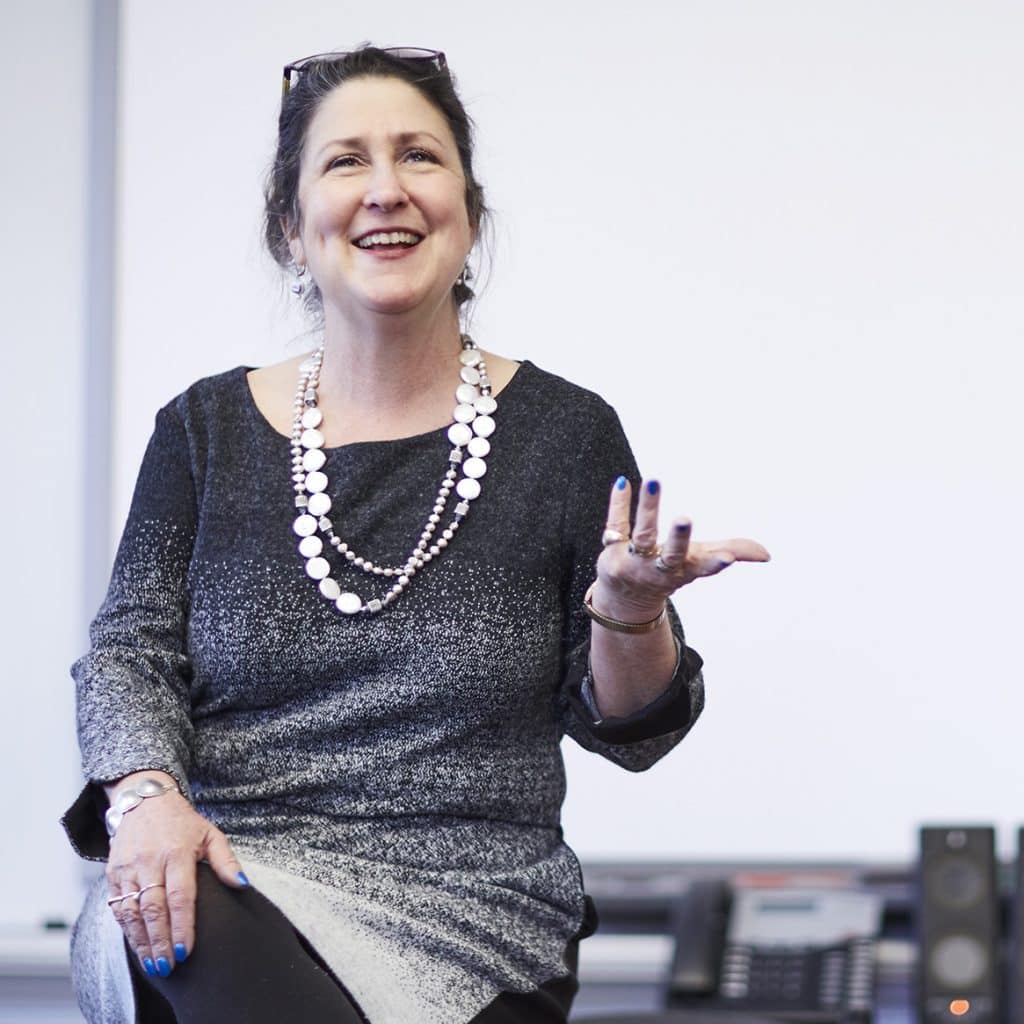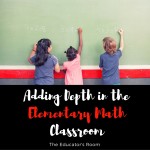Overview:
Oedipus Rex is a greek tragedy loved by many, this teacher uses the play to engage with her favorite muse, her teacher.
1974. Ninth grade. The Agnes Irwin School, a private all-girls’ school outside of Philadelphia, where most of my female relatives had also gone to school. I was a lifer, which meant I came in kindergarten and grew up with many of the same girls, but in Ninth grade, the class expanded, with girls joining us from public schools that ended before high school. We went to school in the new wing—a 1960s addition with lots of glass and a wall of windows at the rear of the English classroom. I sat on the right side of the room, a few people back from the teacher’s desk.
Were there bookshelves next to me? Where was the blackboard? What did the room smell like?
There is a lot I have forgotten.
Here’s what I remember. Freed of the blue tunics we had worn since fourth grade, we sported navy and gray plaid kilts—our skirts were a lot longer than the green skirts the girls wear rolled at the school I now lead. My yellow oxford button-up shirts gapped because of my big chest. We wore knee socks with clogs or topsiders or Wallabees— the other day, I asked a sophomore in my school if she had ever heard of Wallabees—her tie-Uggs reminded me of them, but she had not.
Evelene Dohan was my English teacher. Everyone knew she was brilliant—like her two daughters, who were a few grades ahead of me. I think she was a widow. She was tall, perhaps 6 feet. Her hair was fiercely curled and sprayed, like a helmet–sort of paper bag brown gone gray, and in memory, she is wearing tweed skirts in shades of brown, too, starched white blouses with a brooch at her throat, a wheat-colored cardigan, sensible tie pumps. Strong features.
When I imagine the goddess Athena, she has Mrs. Dohan’s features—not beautiful but wise and strong. She was no-nonsense, the kind of teacher who called on the daydreamers and gave plenty of pop quizzes. Yes, she was stern, but she had dry sense of humor that I got, even though many of my classmates didn’t. I adored her. From our summer reading book reports—I chose Katherine by Anya Seton, an enormous novel set in England–I knew she approved of me. Never one to heap praise, with the lift of an eyebrow or a tight smile, she confirmed that I had done a good job.
It was in Mrs. Dohan’s class that I learned I saw things not everyone else saw: metaphors, symbols, imagery. I had always been a reader, but now I was a thinker, too. I had secret powers—the ability to decode, to see that an author didn’t just do stuff by accident—Shakespeare intended the imagery of the natural world to mirror the chaos of MacBeth’s ascent to power. Under Mrs. Dohan’s demanding inquiries, I was able to call up all the family relationships I’d devoured in Middle School from my big yellow copy of D’Aulaire’s Greek Mythology—the type of soap opera I found even more entertaining than General Hospital, to which my older sister and I were addicted. My ability to recall which god was related to whom and which hero had killed another was validated by her small smile.
Mrs. Dohan taught me how to devise a thesis and prove my points, using the text to back up what I thought. She showed me, too—and I am not sure how she did this—that I was smart enough not to need to raise my hand to answer every question—under her tutelage, I learned not to hog the air space.
In ninth grade, I was fiery and absolute. Antigone was right. Ismene was a wimp. I took careful notes, notes I’d lecture when I taught Greek tragedy to my sophomores at my first teaching job in a boarding school: rising action, moment of choice, moment of recognition, denouement, hubris, catharsis printed in my careful hand. They were excellent notes.
Teaching Greek tragedy, as it happened, was a constant for much of my 40+ year career as an English teacher. Oedipus Rex and Antigone seemed to appear on every syllabus. I could teach them blindfolded, which is pretty funny, given Oedipus’ fate.
“Oedipus,” I corrected, year after year, “Not Oh-eedipus and Kree-on, not Crayon.”
This year, my last at Laurel, the school I’ve led for more than 20 years, I found myself, once again, in a ninth-grade English classroom, with Mrs. Dohan as my muse. A colleague had a heart attack a few weeks into the school year, collapsing in the middle of class. The girls screamed. A history teacher heard and administered CPR. The school nurse and the paramedics arrived fast. By the time I got there, the teacher was conscious again, worried about the kids, cracking jokes. I found the girls, ashen and weepy, in another room and reassured them that all would be well, my fingers crossed behind my back to protect me from the possibility that I might be lying. Sometimes, we have to fudge the truth—as it happens, I was right.
“Who can take Howard’s class?” our Director of Teaching and Learning asked after Howard had been carried away in the ambulance.
“My travel schedule is a lot,” I said, looking around my office where my leadership team and I huddled—it was like that drinking game where you put your finger on your nose if you don’t want to be called on. Everyone was already doing too much.
“But if I can have back up, I certainly know the curriculum,” I volunteered.
I had taught ninth grade for many years, bowing out a few years ago because I was on the road so much trying to raise money—instead, for the past several years, newly minted MFA in hand, I taught a creative writing class to the whole ninth grade once a week. Picking up Howard’s section would mean I’d have my regular three sections of creative writing plus an English class that met every day.
So, I found myself, in the fall of my last year of headmistress-ing, once again, diving into Oedipus Rex with a group of 9th graders. If Howard was the cool teacher, I think, when I wasn’t watching. I grew into being more like Mrs. Dohan than I realized.
“Are you with me, Stella?” I asked, noting that the beauty was gazing into space and not looking at her book.
“Pop quiz tomorrow,” I announced the other day.
“Pop quiz?” they protested. “On what?”
“On everything,” I smiled. “Vocabulary, plot, you name it. Now do you see why you need to take notes?” They groaned.
“Our vocabular quizzes are cumulative?” Dylan grumped.
“Absolutely,” I nodded. “Otherwise, you won’t remember what you learn.”
“This is a lot,” she said grimly. “Quizzes every single week?”
They were mourning Howard; who was this impostor?
I loved being with them and could not wait to start Greek tragedy. Guinevere had been to Greece and showed us photos of an amphitheater. Some years ago, the girls and I had acted out sacrificing a goat puppet, so I could help them understand how theatre evolved from religious ritual, but the goat had gone missing, and my prancing around the very tight classroom trying to show them how a Greek chorus might have functioned—I chanted and waved my arms–was met with blank faces. Though the girls who have been at Laurel had studied mythology in 6th grade, many of the new girls hadn’t—their Catholic or Jewish days schools hadn’t covered the goings on of immortal gods and goddesses—and, too few of the girls who had been taught about the inhabitants of Mt. Olympus remembered much—insert rant about how kids forget all they learn b/c we don’t ask them to keep using it here.
Hayden, formerly Heidi, though, remembered everything. Their knowledge of the Greeks was prodigious, and Lucy and Ruby, former Percy Jackson fans, were pretty good, too. I decided we’d read Oedipus Rex aloud, but reading aloud was tricky, too. Most read with little vocal energy. I shouted, “These are big emotions—Thebes is dying—rise to the intellectual challenge the Greeks demand.” The girls looked at the floor.
We had three terrible days—spoke and wheel teaching, which means I did all the instructing, and they answered, reluctant, dragged through the text, mostly hoping I wouldn’t call on them. They couldn’t care less. I felt like a lousy teacher, excoriating myself.
“I’m supposed to be good at this,” I whined to my husband.
’This might be the last time I ever get to teach English,” I fussed.
“Uh huh,” he said.
And then. On Tuesday, we were reading aloud. I’d chosen good readers on purpose and decided not to interrupt them—who cared if they missed all the figurative language? I wanted them to feel the tension, feel Oedipus’ paranoia. I’d been dropping hints about Tiresias’s prophecy, trying to lead them to understand dramatic irony, which is hard when you do not know the plot, when Raina announced,
“It’s him. Oedipus is the plague.”
“No way,” protested Ruby.
Hayden demanded we look at a few lines Tiresias had spoken. “Intimate—it says right here intimate—he married his mom.”
“What?” Eva blinked. “That’s gross.”
“Are you sure?” I asked.
And suddenly they were off—a crazed chariot careening around a battlefield, frothing horses pulling at the reins. The charioteer—me, in this case—was delighted and utterly unable to control them.
They were talking over each other, arguing, revelation dawning, revulsion, delight that they had figured it out—or believed they had, pointing to lines I thought they had missed all together from our discussions earlier in the week. Some were sympathetic to Oedipus, others horrified, all engaged.
It was like a courtroom turned upside down—me, the quiet judge, listening to multiple prosecutors and defenders, who were righteous and insistent—a little bit like I had been in 9th grade—before my brother died, before I understood that absolutes are a luxury, a privilege, before I knew I would grow up to teach English and drama, that I would take comfort in stories and in sorrows that were not my own as way to make sense of a world that made no sense, before I would lead a school for more than twenty years and make the decision to leave before anyone wanted me to go, before I would look to the future and wish the Oracle at Delphi might reassure me that all will be well in my own next chapter.
Class ended.
“See you Tuesday,” I smiled as the girls gathered their books, still simmering with indignation.
I offered quiet thanks to Mrs. Dohan, who stands Goddess-like in my memory—a champion who has been with me since I, too, was once 14.

Ann V. Klotz a teacher and writer in Shaker Heights, OH. My work has appeared in various publications, including Yankee Magazine, Multiplicity, Literary Mama, and the Brevity Blog. My Tiny Love Story was published by the New York Times. You can read more of my work at www.annvklotz.com





